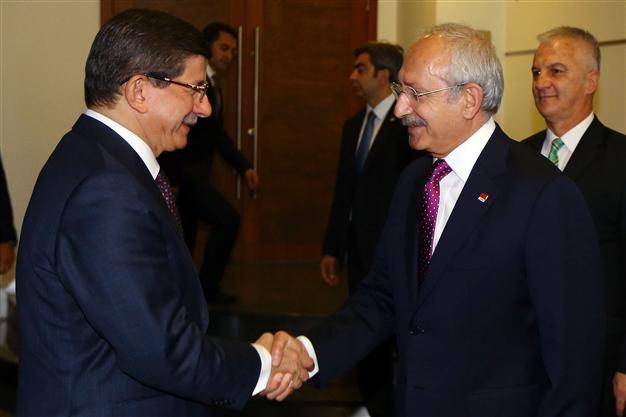PM calls for unity against violence before coalition meeting with CHP
ANKARA

AFP Photo
Prime Minister Ahmet Davutoğlu has called on all political parties to take a common stance for the outlawed Kurdistan Workers’ Party (PKK) to lay down arms only one day before a key meeting with the leader of the Republican People’s Party (CHP) to conclude weeks of coalition talks.“I call on all political party leaders to embrace public order, democracy and take a common stance on the issue of laying down arms,” the prime minister said on his Twitter account on Aug. 9.
At the meeting with CHP leader Kemal Kılıçdaroğlu, he will discuss these issues along with that of a potential government partnership, Davutoğlu said.
Whichever way the process leads, his party will do whatever is necessary for the responsibility of governing the country, he added.
The prime minister’s remarks came after Peoples’ Democratic Party (HDP) co-chair Selahattin Demirtaş’s call on the Turkish government and the PKK to resume their ceasefire before visiting the family of a slain soldier.
“We are making a call today to both sides. The PKK should immediately remove their hands from the trigger, declaring that it would comply with the terms of the reinforced ceasefire,” Demirtaş said on Aug. 8. Davutoğlu said the call as a late but important one.
Justice and Development Party (AKP) leader Davutoğlu will meet with Kılıçdaroğlu at 6 p.m. on Aug. 10 to seek an agreement in the coalition talks.
The party leaders will meet with the attendance of Haluk Koç from the CHP and Ömer Çelik from the AKP, after a cabinet meeting at which the AKP ministers will discuss the CHP’s conditions on government policies.
The AKP discussed the outcome of preliminary coalition talks with the CHP at the meeting of the Central Executive Board (MYK) on late Aug. 7.
Ahead of the Aug. 10 meeting between Davutoğlu and Kılıçdaroğlu, the prime minister briefed his party members on the CHP’s preconditions for a coalition government.
The AKP considers 30 percent of the conditions for a coalition government laid down by the CHP as difficult to agree to.
Some 60-70 percent of the conditions laid down by the CHP are agreeable, but the rest would make a coalition difficult, according to the AKP members’ conclusion after the MYK meeting, daily Hürriyet reported.
If Kılıçdaroğlu and Davutoğlu cannot overcome those differences, such as foreign policy, particularly with Syria, and issues on education, an agreement between the two parties for a coalition government is unlikely, the daily reported.
AKP party members are worried about the closure of İmam Hatip schools - religious vocational high schools - along with the CHP’s future attitude over the position of President Recep Tayyip Erdoğan.
Some AKP members offered to try a coalition with the Nationalist Movement Party (MHP) or a minority government, while some supposed the party could not rely on the CHP and a coalition would not be productive, urging for a snap election in order to regain the party’s parliamentary majority.
The grassroots of the AKP do not favor a coalition with the CHP and with the MHP’s unwillingness to form a coalition government with the AKP, the party grassroots are eager to call a snap election.
The economy cadre of the government instead prefers a broad-based coalition government, arguing the current situation produces instability and eventually influences the country’s economy negatively.
Surveys reportedly conducted for the AKP showed minor changes in voter behavior were not enough to bring the AKP a parliament majority, while the MHP and the HDP were unlikely will drop below the 10 percent election threshold.
Delegations from the AKP and CHP concluded nearly 30 hours of exploratory talks in which they examined each other’s red lines on main political issues in a bid to see whether there is ground for the formation of a shared government. The two parties’ delegations separately submitted reports to their leaders for their final decision on the fate of what many have called a grand coalition.
















